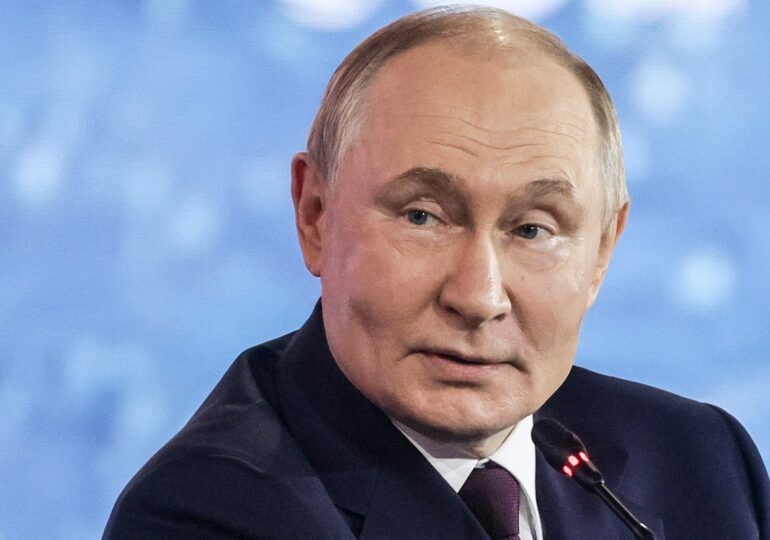When Vladimir Putin first announced that he would host a „Russia-Arab World” summit, the Kremlin imagined leaders from the region flying to Moscow to discuss regional security and energy relations, under the leadership of the Russian leader.
Announced in April and prepared for several months, the summit was scheduled for Wednesday, intended to be a demonstration of Moscow’s enduring influence in the Middle East and proof that it remains far from isolated, despite Western sanctions.
But Putin was forced to postpone the meeting - after only a handful of leaders, including Syria's President Ahmed al-Sharaa and Arab League chief Ahmed Aboul Gheit, confirmed their attendance, writes The Guardian.
Instead, global attention turned to Egypt on Monday, where world leaders gathered for a "peace summit" in Gaza - with Russia notably absent.
In Sharm el-Sheikh, Donald Trump joined Egypt's Abdel Fatah al-Sisi to welcome heads of state from the Middle East and Europe as they signed the long-awaited Gaza treaty, leaders jostling to be photographed alongside the US president.
- World leaders signed the Gaza agreement. Trump: It took 3,000 years, but it will endure (Video)
- It's wrong to compare Trump to Kissinger. Rather with Taylor Swift
Although analysts say Moscow was never expected to play a major role in the Gaza peace process, its absence in Egypt underscored a reality that the Kremlin hesitates to admit: as the war in Ukraine continues: its influence in the Middle East - long considered a counterweight to the West - is waning.
"Russia's diplomatic role in the Middle East has declined due to the war in Ukraine. When it comes to all major developments, the main players in the region no longer look to Moscow," said Hanna Notte, an expert in Russian foreign policy.
The Egypt summit also highlighted a shift in the region, where many leaders are now focusing on strengthening relations with Trump, as Washington's frustration grows over Putin's refusal to end the war in Ukraine.
How Putin Has Moved Away from the Middle East
For almost a decade, the Middle East has served as a stage for Putin's long-awaited return to global prominence.
Russia's military intervention in the Syrian civil war in 2015 saved Bashar al-Assad's regime from collapse, secured permanent naval and air bases in the Mediterranean Sea, and revived Moscow's image as a power capable of projecting force far beyond its borders.
Through its large-scale invasion of Ukraine, Moscow was forced to divert a significant portion of its military, economic, and diplomatic capacity, leaving it unable to support Assad as his regime crumbled.
Additionally, its other key ally, Iran, has seen parts of its military and economic infrastructure repeatedly hit by Israeli attacks.
Despite years of cultivating ties with the Palestinian Authority and hosting Hamas delegations for discussions in Moscow, Russia played no tangible role in the negotiations that led to the Gaza ceasefire.
By largely siding with the Palestinians and cozying up to Iran, Putin strained his once warm relationship with Benjamin Netanyahu. Ukrainian President Volodymyr Zelensky said last month that Israel transferred a Patriot missile system to Kyiv.
Russian Frustration
In public, Russia's elites have praised Trump's efforts to end the Gaza war. Putin said last Friday that he offered to postpone his own global Russia-Arab World summit "not to interfere" with Trump's initiative and praised the US-led efforts to end the Gaza war.
"If Trump manages to achieve everything he has set out to do, it would be a truly historic event," he told reporters during a visit to Tajikistan.
However, frustration at being sidelined has seeped among top Russian officials.
Veteran Foreign Minister Sergey Lavrov said on Monday that while Russia "will not refuse to participate in efforts to resolve the Middle East issue if invited," the Kremlin will not "impose its services."
There have also been open criticisms of Trump's agreement.
"The release of Israeli hostages and Palestinian prisoners is a good thing, of course, but it will not solve anything. Until a Palestinian state with full rights is established, in accordance with well-known UN resolutions, nothing will change. The war will continue. Everyone understands this," said Dmitri Medvedev.
Other States Constantly Moving Away from Moscow's Orbit
Russia's disappearance as a global influencer extends beyond the Middle East.
In Central Asia and the Caucasus, states once considered loyal satellites - including Kazakhstan, Armenia, and Azerbaijan - are constantly moving away from Moscow's orbit as Russia's invasion of Ukraine has forced them to reassess potential risks to their own security.
In August, Trump hosted the leaders of Armenia and Azerbaijan at the White House after mediating a peace agreement between them.
The agreement granted Washington exclusive rights to develop the so-called Trump Route for Peace and International Prosperity, a corridor that traverses Armenia and connects Azerbaijan to its exclave Nakhchivan on the border with Turkey.
It is worth mentioning that both Armenian Prime Minister Nikol Pashinyan and Azerbaijani President Ilham Aliyev traveled to Egypt on Monday.
Putin will have another opportunity to host leaders from the Arab world, with the Kremlin indicating that the summit is likely to be rescheduled for November.

